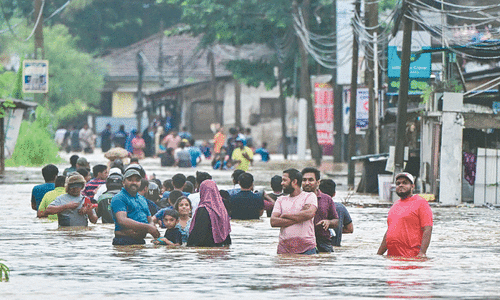PANGKALAN BUN: After nearly a week of searching for the victims of AirAsia Flight 8501, rescue teams battling monsoon rains had their most successful day yet, more than tripling the number of bodies pulled from the Java Sea, some still strapped to their seats.
Of the 30 corpses recovered so far, 21 were found on Friday, many of them by a US Navy ship, according to officials. The Airbus A320 carrying 162 passengers and crew went down on Sunday, halfway into a flight from Surabaya, Indonesia’s second-largest city, to Singapore.
Minutes before losing contact, the pilot told air traffic control he was approaching threatening clouds, but was denied permission to climb to a higher altitude because of heavy air traffic.
It remains unclear what caused the plane to plunge into the sea.
The accident was AirAsia’s first since it began operations in 2001, quickly becoming one of the region’s most popular low-cost carriers.
Indonesian authorities on Saturday grounded AirAsia flights from Surabaya to Singapore, with the Transport Ministry saying the airline did not have a permit to fly on Sundays.
AirAsia said it was reviewing the suspension. Search teams aboard 13 aircraft and 30 ships expanded their hunt for victims and wreckage on Saturday, although 3-metre high waves continued to slow down the operation, said National Search and Rescue Agency Director of Operations Suryadi B. Supriyadi.
The vessels included eight sophisticated navy ships from Singapore, Malaysia and the US equipped with sonars for scouring the seabed to pinpoint wreckage and the all-important black boxes.
“Many of passengers believed to be still trapped inside the plane’s fuselage and could be discovered soon,” Supriyadi said, “God willing, we would complete this operation next week”. The data recorder contains crucial information like engine temperature and vertical and horizontal speed; the voice recorder saves conversations between pilots and other sounds coming from inside the cockpit.
Toos Saniotoso, an Indonesian air safety investigator, said investigators “are looking at every aspect” as they try to determine why the plane crashed”. From the operational side, the human factor, the technical side, the ATC (air traffic control) — everything is valuable to us. “Bad weather, which has hindered the search for the past several days, remained a worry. Rain, strong winds and high waves were forecast until Sunday. Strong sea currents have also kept debris moving. That has severely slowed recovery efforts as bodies drift farther and farther away. Col. Yayan Sofiyan, commander of the warship Bung Tomo, told MetroTV his vessel managed to pull seven bodies from the choppy waters on Friday, five still fastened in their seats.
Published in Dawn, January 4th, 2015
On a mobile phone? Get the Dawn Mobile App: Apple Store | Google Play













































Dear visitor, the comments section is undergoing an overhaul and will return soon.